main: November 2010 Archives
Brad Goode, Tight Like This (Delmark). During his Chicago days, Goode worked through his influences, notably Dizzy Gillespie and Clifford Brown, into early individuality. He has a Gillespie moment during his muted solo on the exotic 1942 Xavier Cugat song "Nightingale," but it's a rare example of his playing a direct quote. Goode has serious fun exercising his trumpet virtuosity. Creativity and taste balance his technical skill so that his 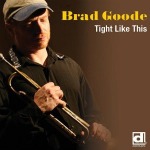 smears, swoops, glissandos, flawless interval leaps and notes in the stratosphere serve the music. Louis Armstrong's solo on "Tight Like This" (1928) and Bix Beiderbecke's on "Changes" (1927) are among the early milestones of recorded jazz trumpet. They may have had an effect on Goode, but it would take microscopic analysis of his playing on those tunes to turn up traces of anything resembling imitation. His approach on "Tight Like This," while spectacular and often high above the horn's normal range, is relatively conservative in content. Elsewhere, it's another story. In their solos on "Changes," both he and pianist Adrean Farrugia go adventuring outside the borders of the harmonic structure, abetted by bassist Kelly Sill and drummer Anthony Lee, who shine throughout the album.
smears, swoops, glissandos, flawless interval leaps and notes in the stratosphere serve the music. Louis Armstrong's solo on "Tight Like This" (1928) and Bix Beiderbecke's on "Changes" (1927) are among the early milestones of recorded jazz trumpet. They may have had an effect on Goode, but it would take microscopic analysis of his playing on those tunes to turn up traces of anything resembling imitation. His approach on "Tight Like This," while spectacular and often high above the horn's normal range, is relatively conservative in content. Elsewhere, it's another story. In their solos on "Changes," both he and pianist Adrean Farrugia go adventuring outside the borders of the harmonic structure, abetted by bassist Kelly Sill and drummer Anthony Lee, who shine throughout the album.
In other familiar material, the four often loosen or tighten the time within set tempos. Their elastic rhythmic collaboration produces stimulating tension and release in Irving Berlin's "Reaching For the Moon." 1940s trumpet icon Freddie Webster's "Reverse the Charges" finds Goode puckish in a muted workout on slightly altered "I Got Rhythm" changes. Lee's drum commentary punctuates Sill's spirited solo on the piece. Farrugia constructs a solo mainly using fragments until he builds into full employment of both hands and displays a rich harmonic imagination. With the rhythm section surging in a fast ¾ treatment, Goode floats into "Softly, As in a Morning Sunrise" to create a solo of remarkable fluidity and continuity of ideas. He plays his ballad "Midwestern Autumn" muted and close to the microphone in a mood of reflection. The progressive harmonies of "Climbing Out" allow freedom that Goode and Farrugia revel in, with the trumpeter making joyous octave jumps. "Summary," "The River" and "Bob's Bounce" are additional evidence that Goode is a composer of substance as well as a formidable improviser. This band deserves attention. It rewards close listening.
Well, the way I play, I try not to be a 'repeater pencil', ya dig? Originality's the thing. You can have tone and technique and a lot of other things but without originality you ain't really nowhere. Gotta be original.—Lester Young
When Lester plays, he almost seems to be singing; one can almost hear the words.—Billie Holiday
In some ways Lester Young is the most complex rhythmically of any musician. He does some things which are just phenomenal.—Lee Konitz
Anyone who doesn't play like Lester Young is wrong.—Brew Moore
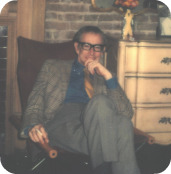 It has become a Rifftides tradition to remember Paul Desmond's birthday. The 86th anniversary of his birth coincides with the American celebration of Thanksgiving, as did the 52nd, his last. For the occasion in 1976, Devra Hall cooked a turkey dinner for Desmond and her parents, Jim and Jane. She took the photograph that afternoon. Here's the story of the end of that part of the day, told by Devra in Take Five: The Public and Private Lives of Paul Desmond.
It has become a Rifftides tradition to remember Paul Desmond's birthday. The 86th anniversary of his birth coincides with the American celebration of Thanksgiving, as did the 52nd, his last. For the occasion in 1976, Devra Hall cooked a turkey dinner for Desmond and her parents, Jim and Jane. She took the photograph that afternoon. Here's the story of the end of that part of the day, told by Devra in Take Five: The Public and Private Lives of Paul Desmond.
"It was a very quiet dinner. Paul was not feeling well, but he was clearly happy not to be home alone. He didn't have to say a word around my folks. They talked a blue streak, usually, but he was just very comfortable. My fondest recollection is that I made him dinner on his last birthday."
The senior Halls and Desmond went back to Jim and Jane's apartment when they left Devra's, and on the way stopped at the Village Vanguard. Thelonious Monk was performing there. Between sets, they all gathered in the Vanguard's kitchen, the closest thing the club has to a Green Room. In the book, Jim tells about it.
It was the most coherent conversation I ever had with Thelonious, in the kitchen with Paul and me and Thelonious. I had a sort of nodding acquaintance with Monk, but he and Paul really connected. I'm not even sure what they talked about, just standing around in that kitchen, going through old memories and things. It was nice.
I wish that Desmond and Hall had sat in with Monk at the Vanguard. Alas, Paul almost never sat in with anyone, including the night he and I went to hear Bill Evans and Bill all but begged him to play. But that's another story. It's in the book. In lieu of a collaboration with Monk, let's listen to Desmond solo in a relatively little known performance of "Stardust," a tune that he and Dave Brubeck recorded several times over the years. This was 1953, a productive and creative year for the early edition of the Brubeck quartet.
If you saw a slightly different version of this post here last year, please be patient. You're likely to see it again next year.
Orrin Evans, Eric Revis, Nasheet Waits & Guests, Tarbaby: The End of Fear (Posi-tone). Pianist Evans, bassist Revis and drummer Waits comprise a leaderless or cooperative trio who live up to the album's subtitle. They are not afraid to go wacky, nearly unhinged, in two free pieces, "Heads"—featuring trumpeter Nicholas Payton at his most liberated and chancy—and "Tails," with the avant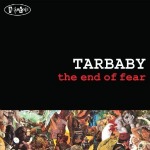 garde alto saxophonist Oliver Lake sitting in. Payton and Lake rein in their wildness for the melody choruses in a quintet interpretation of Sam Rivers' "Unity" but hold back little in their solos and simultaneous improvisation. Tarbaby is not afraid to plumb the romance and lyricism of Fats Waller's 1932 ballad "Lonesome Me," with a touching reading of the melody by tenor saxophonist J.D. Allen. In "Brews" Evans is not afraid to skew the good old B-flat blues toward the lamented, half-forgotten pianist Herbie Nichols and a couple of chromatic runs straight out of Teddy Wilson. Nor in his "Jena 6" is he afraid to demonstrate the harmonic individualism that makes him one of the most interesting jazz pianists under 40 (he's 34).
garde alto saxophonist Oliver Lake sitting in. Payton and Lake rein in their wildness for the melody choruses in a quintet interpretation of Sam Rivers' "Unity" but hold back little in their solos and simultaneous improvisation. Tarbaby is not afraid to plumb the romance and lyricism of Fats Waller's 1932 ballad "Lonesome Me," with a touching reading of the melody by tenor saxophonist J.D. Allen. In "Brews" Evans is not afraid to skew the good old B-flat blues toward the lamented, half-forgotten pianist Herbie Nichols and a couple of chromatic runs straight out of Teddy Wilson. Nor in his "Jena 6" is he afraid to demonstrate the harmonic individualism that makes him one of the most interesting jazz pianists under 40 (he's 34).
Enough of the fear gambit. On the Nasheet Waits composition "Hesitation," Payton covers the range of the trumpet using a spacious tone in all registers and a succession of connected ideas laden with emotion. This is among his best recent work. Payton, Lake, Allen and the rhythm section light up Andrew Hill's "Tough Love." Hip-hop aficionados may be able to understand the spoken conversations woven into the opening track, "E-Math," although I suspect that the chatter was intended not to be understood but to supply atmosphere. It does that, but only the most agile brain will be able to separate the flows of music and voice. Perhaps it's best to let it just wash over you. At any rate, it lasts only two minutes or so, then the album moves on to the marvelous "Brews" and the rest. Through pieces composed by members of the band plus those by Hill, Waller, Rivers, Paul Motian and—surprisingly—the hardcore punk/reggae group Bad Brains' "Sailin' On," Tarbaby and friends give us an album that seems all but certain to wind up on the year's 10-best lists.
 Dave Brubeck's new pacemaker seems to be working. Here's a headline from this morning's Worcester (MA) Telegram-Gazette:
Dave Brubeck's new pacemaker seems to be working. Here's a headline from this morning's Worcester (MA) Telegram-Gazette:
To read a review of Friday night's concert in Worcester, go here.
We have found no explanation of why Chris Smith and Cody Cox were substituting for Michael Moore and Randy Jones, Brubeck's regular bassist and drummer.
Pianist Jack Reilly's recital at the Johns Hopkins Medicine Center in Baltimore on November 9 paid musical tribute to the memory of the doctor who saved his life.
The concert of Reilly's original work was recorded. To see and hear it, click here. Thanks to the folks at Johns Hopkins for providing the printed program.
BOOK ONE
1) C Major 7) E flat Major
2) C Minor 8) E flat Minor
3 D flat Major 9) E Major
4) C sharp Minor 10) E minor
5) D Major 11) F Major
6) D Minor 12) F Minor
INTERMISSION
BOOK TWO
13) F sharp Major 19) A Major
14) F sharp Minor 20) A Minor
15) G Major 21) B flat Major
16) G Minor 22) B flat Minor
17) A flat Major 23) B Major
18) G sharp Minor 24) B Minor
Dave Brubeck's 90th birthday is on December 6. Observances are beginning. This weekend in Minneapolis, Minnesota, the Metropolitan Symphony Orchestra under music director William Schrickel will play a celebratory concert with three pieces by Brubeck. 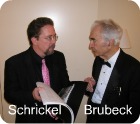 They include one of his first extended orchestral works, Elementals, and the U.S. premiere of an adaptation for solo violin and strings of "Sleep, Holy Infant" from La Fiesta de la Posada. Three others pieces on the program are by George Gershwin, Leonard Bernstein and Darius Milhaud, composers Brubeck admires. The Milhaud piece is La Création du monde, the French composer's 1923 venture into jazz, the music he often credited with revitalizing European art in the 1920s. Following World War Two, Brubeck studied with and was encouraged by Milhaud at Mills College in California.
They include one of his first extended orchestral works, Elementals, and the U.S. premiere of an adaptation for solo violin and strings of "Sleep, Holy Infant" from La Fiesta de la Posada. Three others pieces on the program are by George Gershwin, Leonard Bernstein and Darius Milhaud, composers Brubeck admires. The Milhaud piece is La Création du monde, the French composer's 1923 venture into jazz, the music he often credited with revitalizing European art in the 1920s. Following World War Two, Brubeck studied with and was encouraged by Milhaud at Mills College in California.
As Schrickel, was planning the concert, Brubeck's son Chris sent him this photograph of a self-portrait that Milhaud gave the Brubeck family in 1958. The lines of the drawing are themes from La Création du monde.
The message in the bottom right corner reads, "To the 7 Brubecks, the Owner of the Square Foot. Souvenir of Creation du Monde, Milhaud 1958." In a note to Bill Schrickel, Iola Brubeck explained:
The reference to the "square foot" stems from the fact that Milhaud was a Jewish refugee in this country. His apartment in Paris was destroyed by the Nazis when they occupied Paris and the German elite took over his family home in Aix-en-Provence. His parents remained on the estate disguised as gardeners. Amazingly, no one gave away the secret. However, Milhaud never saw his parents again. They died before the war was over and he could safely return to Europe in 1947. When we were building our new home in Oakland, he asked that we reserve one square foot for him, because he said "I want to have someplace I can stand and say "this is myown". We did just that. We reserved one square foot--unfinished--in the hearth of the living room fireplace. When he visited us in 1958, he saw the square foot, asked for a piece of paper and the next day we received in the mail the sketch of Milhaud and the themes from Creation du Monde. We have the piece of paper in a safe and had the portrait engraved on copper to place in the hearth. When we moved to the East Coast we brought it with us, and that is what Chris photographed for you.
For details about Sunday's concert and to hear an interview with Bill Schrickel about Brubeck's effect on his musical life, go here.
Correspondence from Bill Kirchner, saxophonist, composer, arranger, teacher, author, broadcaster (does this guy sleep?):
Recently, I taped my next one-hour show for the "Jazz From The Archives" series. Presented by the Institute of Jazz Studies, the series runs every Sunday on WBGO-FM (88.3).
After graduating from North Texas State University and playing with the Stan Kenton and Woody Herman orchestras, trumpeter Marvin Stamm (b. 1939) settled in New York City in 1966. For more than two decades, he was a first-call studio musician. Since the late 1980s, he has concentrated on his career as a touring jazz soloist.We'll hear Stamm playing on recordings with composer-arrangers Johnny Carisi, Frank
Foster, Thad Jones, and Rich Shemaria, and with his own quartet (with pianist Bill Mays, bassist Rufus Reid, and drummer Ed Soph) and The Inventions Trio (with Mays and cellist Alisa Horn).
The show will air this Sunday, November 21, from 11 p.m. to midnight, Eastern Standard Time.
NOTE: If you live outside the New York City metropolitan area, WBGO also broadcasts on the Internet at www.wbgo.org.
Rifftides is adding to the blogroll at the bottom of the center column a link to Stamm's website. At the site, there's a link to Cadenzas, his newsletter of interesting reflections and, often, provocative thoughts about music and life.
It happens now and then: I am tied up on deadline for an article that demands extensive research. The Rifftides staff reports that there is no stash of shelf material, a serious breach of preparedness. They will be reprimanded. In a life misspent in journalism I have been conditioned to find dead air and blank space unacceptable. That translates to discomfort when the blog goes unrefreshed.
Fortunately, a solution arrived in the form of a fine video to which a friend alerted me. This is a performance in 2000 by Charlie Haden's Quartet West at the Jazz Baltica festival in Germany. The piece is Haden's "Hello, My Lovely." The arrangement, presumably by Alan Broadbent, is for the quartet and the Schleswig-Holstein Chamber Orchestra. Broadbent conducts and plays piano. Haden is the bassist, Larance Marable the drummer. Tenor saxophonist Ernie Watts outdoes himself. Bill Henderson is mentioned in the on-screen credits, but he is nowhere to be seen or heard. The high quality of the picture makes full-screen viewing a good idea.
The Haden Quartet's debut recording of "Hello, My Lovely" is on this album.
This is neither the anniversary of Danny Barker's birth (January 13, 1909) nor of his death (March 13, 1994). I need no special occasion to write about Danny. He was born in New Orleans, where I served with him on the board of the original New Orleans JazzFest and was lucky enough to become his friend. No one has ever had a warmer, more genuine companion.
Largely because he reverted to banjo after he returned home in the '60s, Danny has been typecast as a traditionalist and, because of his singing, as an entertainer. Both labels apply, but there was more. He was a musician of wide scope, deep harmonic knowledge and the gift of swing—a catalyst in any musical setting. As a very young man, he played with Jelly Roll Morton and Sidney Bechet and, after he moved to New York, with James P. Johnson and Henry Red Allen. In the 1930s, he was the rhythm guitarist in some of the best bands of the decade, including those of Lucky Millinder, Benny Carter and Cab Calloway.
Barker provides propulsion in this piece from a 1939 Teddy Wilson all-star date with—in solo order—Wilson, Benny Carter, Roy Eldridge, Carter, Billie Holiday, Eldridge, Wilson and Ernie Powell. Milt Hinton is the bassist, Cozy Cole the drummer.
As bebop was developing in the early 1940a, Barker and his bassist chum Milt Hinton from the Calloway band jammed with Charlie Parker and Dizzy Gillespie. He recorded in 1945 with pianist Sir Charles Thompson in a not-quite-bop session that also included Parker, Dexter Gordon, Buck Clayton, bassist Jimmy Butts and drummer J.C. Heard. Be patient; it takes the disc jockey half a minute to get the needle onto the record.
Barker was a superb natural entertainer who reached into his Creole heritage to give authenticity to pieces like this one at the Ascona jazz festival in Switzerland.
I tried to find a recording that I could embed of Danny singing his most famous composition, "Save the Bones for Henry Jones." No luck. You'll find it on this album. "Save the Bones" was a hit in separate versions by Nat Cole and Johnny Mercer. Here, they collaborate on the song in one of Cole's television programs in the 1950s.
During his later years, Danny was curator of the New Orleans Jazz Museum and grand 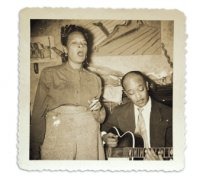 marshal of the Onward Brass Band. He and his wife, the singer Blue Lu Barker, frequently performed together. They are pictured here in 1950 or so (courtesy of the Tulane Hogan Jazz Archive). Danny took under his wing developing young musicians, including Branford and Wynton Marsalis and Nicholas Payton, and helped them to absorb the New Orleans tradition and spirit. He never flagged in doing all that he could to insure that the city's music thrived. New Orleans has a big place in its heart for Danny Barker, and so do I.
marshal of the Onward Brass Band. He and his wife, the singer Blue Lu Barker, frequently performed together. They are pictured here in 1950 or so (courtesy of the Tulane Hogan Jazz Archive). Danny took under his wing developing young musicians, including Branford and Wynton Marsalis and Nicholas Payton, and helped them to absorb the New Orleans tradition and spirit. He never flagged in doing all that he could to insure that the city's music thrived. New Orleans has a big place in its heart for Danny Barker, and so do I.
A couple of days ago, I called a company for technical support. A well-spoken young woman answered. She did not put me on hold, dump me into voice-mail hell, pass me along to a robot or connect me with someone in Bangladesh. In about three minutes, she analyzed the problem and provided a solution. At the end, she did not try to sign me up for an extended warranty, sell me more stuff or ask me to complete a survey. I know—you've called tech support. You find this hard to believe. It's true.
To protect the company's switchboard from being clogged with calls from troubled consumers hungry for the sound of a human voice, I will not identify it. If I blew the whistle on their enlightened customer relations practices, the Association Of Businesses Promoting Telephonic Delay, Obfuscation and Frustration might take them to court in an unfair competition case.
All right, it wasn't a billion-dollar international company manufacturing complex digital equipment. It was a small outfit that makes relatively simple devices. When its customers have problems, it gives them human beings who take an interest, find solutions quickly and don't send callers through procedural hoops or voice-mail loops. The billion-dollar guys could learn something from these folks.
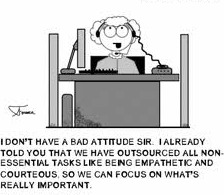
www.callcentercomics.com
I should have long since added Chris Albertson's Stomp Off blog to the Personal Jazz Sites roll under Other Places at the 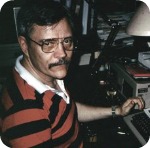 of the middle column. It is hereby added. For your first Albertson fix, I recommend that you take in his latest entry. It has to do with a jam session he recorded in Copenhagen in 1953 that included Art Farmer, Clifford Brown, Gigi Gryce, Jimmy Cleveland and others who were touring with Lionel Hampton's band, as well as several Danish musicians.
of the middle column. It is hereby added. For your first Albertson fix, I recommend that you take in his latest entry. It has to do with a jam session he recorded in Copenhagen in 1953 that included Art Farmer, Clifford Brown, Gigi Gryce, Jimmy Cleveland and others who were touring with Lionel Hampton's band, as well as several Danish musicians.
Albertson (pictured) incorporates two fairly lengthy audio samples of the jam festivities, which coincided with a populous party. Perhaps you will be able to identify the soloists. I can only guess. Chris's accompanying essay explains the circumstances, among them a celebration of the Hamptons' wedding anniversary and his friendship with the storied jazz patron Baron Timme Rosenkranz. To reach Stomp Off, go here.
Bob McChesney writes:
I put up a little video of me demonstrating the first trombone part to "I Love You" live.
To hear, and read along with, McChesney playing that line and three harmony parts, go to this Rifftides archive post.
Jazz as an academic discipline has made huge strides in colleges and universities, even in high schools and middle schools. Students can major in jazz studies in music departments where 40 years ago they would have been suspended for jamming in practice rooms. The University of North Texas, Indiana University, the University of Illinois, Berklee College of Music and the New England Conservatory are among dozens of institutions of higher education turning out hundreds of graduates educated in jazz. In a feedback system not lacking in irony, jazz degrees do not pave the way to making a living in clubs, concerts, festivals and recording studios. Rather, in today's market, many jazz graduates end up teaching in programs that turn out still more musicians unable to sustain themselves performing the music they love.
Problems of economics and our jazz-deaf culture aside, how effective is formal jazz education in transmitting the kind of knowledge and experience—call it wisdom—that musicians in earlier eras accumulated on the road with big bands, playing extended engagements in clubs, sitting in after-hours jam sessions? Do they get the kind of seasoning young Paul Desmond (pictured below) described in a letter to his wife in 1950? He was on the road in New York with Jack Fina's band. Pianist Sanford Gold invited Desmond to a Sunday night session at Eddie Condon's club.
I got out to Condon's after the job, about 10 minutes before they finished. As I came in the club and unpacked the horn, they played, in rapid succession, my threefavorite tunes, things I hadn't even thought of for a year. The rhythm section was swinging, Sanford was playing impeccably, and the horns were miscellaneous and unimpressive, instead of the trumpet-trombone-clarinet thing that I was a bit worried might be there. I had stayed up the night before, was feeling more like playing than I had for years, and the situation seemed expressly designed to restore some of my shattered confidence. One chorus of a ballad, I thought happily as I climbed up on the stand, and at least somebody around here will be interested. If I can just get something across to one person, all is not yet lost. Seething pleasantly with lyrical ideas, I sat down just as they started the last tune of the night. "Cherokee," at a circus tempo. I played miserably. After that, they went home, and Sanford Gold went to the hospital for three weeks for an operation.
Before he left, Peanuts Hucko said "Sounds nice, man." He smiled at me the way I used to smile at Herbie Caro*...*A San Francisco tenor saxophonist not highly regarded by Desmond, who died in the 1940s.
A widespread criticism of modern jazz education is that it concentrates too little on the formative risks of jumping in and possibly failing, as Desmond claimed he did at Condon's, and too much on putting fashionably hip post-Coltrane chords with the
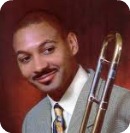 appropriate scales, too much on reading arrangements. Delfeayo Marsalis is a part-time educator who has another method. He is in northern California this week using a special kind of ear training to inculcate in high school musicians a feeling for jazz that cannot flow from manuscript paper. Paul Conley of Sacramento's Capitol Public Radio visited one of Marsalis's classes. To hear his story, go here and click on "Listen Now".
appropriate scales, too much on reading arrangements. Delfeayo Marsalis is a part-time educator who has another method. He is in northern California this week using a special kind of ear training to inculcate in high school musicians a feeling for jazz that cannot flow from manuscript paper. Paul Conley of Sacramento's Capitol Public Radio visited one of Marsalis's classes. To hear his story, go here and click on "Listen Now".
Nothing that is worth knowing can be taught.—Oscar Wilde
Jazz is like writing. It can be learned but not taught.—Paul Desmond
Jenney is famous for eight-bars of trombone improvisation on Artie Shaw's 1940 recording of "Stardust." Several months earlier with his own band, he played a full-length solo on this little-known version of Hoagy Carmichael's classic song.
Pianist Jack Reilly will be at the Johns Hopkins Medicine Center in Baltimore today to pay musical tribute to the memory of the doctor who saved his life.
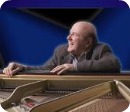 For details, go here.
For details, go here.
Rifftides reader Don Frese recommended this item from Bill Crow's "The Band Room" column in Allegro, the newspaper of New York Local 802 of the American Federation of musicians.
The late British tenor man and club owner Ronnie Scott once told me that he was standing one day on the platform of a tube station in London, and he suddenlyrealized that the man standing next to him was Charles Laughton. Ronnie said excitedly to the great actor, "Excuse me, sir, but I just have to say
what a great fan of yours I am. I have seen everything you've ever done, and admire your work tremendously." Laughton thanked him, and asked, "Are you an actor?" Scott replied, "No, I'm a jazz musician." Laughton considered this for a moment, and then inquired, "Do you have any pot?"
To read Bill's entire November column, go here.
The November 4 post below and coverage elsewhere about James Moody's illness generated so much concern that it has created a problem in the Moody household. Here is part of a message from Moody's wife Linda.
Would you mind posting that people should leave Moody messages on Facebook? Our computers and two e-mail addresses are about to crash. I have had my computer guy here a couple of times in the last 3 days to keep them from crashing. Moody has had an outpouring of love from every corner of this earth.
This is a link to Moody's Facebook page. Please use it to wish him well rather than clogging and possibly crashing his computers with e-mail. I'm sure that the Moodys will appreciate it.
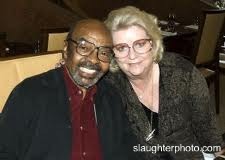
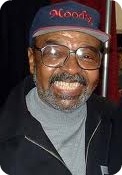 The news about James Moody is not good. He has been aware of it for some time, but kept it private until this week. No one who knows him will be surprised that he is at peace with the decision he has made. Here is the first paragraph of George Varga's story in The San Diego Union Tribune.
The news about James Moody is not good. He has been aware of it for some time, but kept it private until this week. No one who knows him will be surprised that he is at peace with the decision he has made. Here is the first paragraph of George Varga's story in The San Diego Union Tribune.
Jazz saxophone legend James Moody, a San Diego resident for the past 21 years, has disclosed that he has had pancreatic cancer since at least February -- and that he had decided not to receive any chemo therapy or radiation treatment.
To read all of the article, go here.
The last time we were together, in 2007—too long ago—I interviewed Moody on stage at a festival. He reminded me that we had known each other for 50 years and had the kindness to inflate my ego by telling the audience, "And we've been buddies, too." Then he went on to play an astonishing set with the Bill Mays Trio. Go here for a Rifftides account of his concert on that occasion.
On Moody's 83rd birthday, WBGO-FM, the jazz station in Newark, New Jersey, put together this profile using his own words. It summarizes his attitude toward music, people and life.
Now, the musical part of that philosophy in action: Moody has the first solo in this 1985 performance of Dizzy Gillespie's "Ow," with Gillespie, Ray Brown, Gene Harris and Grady Tate.
Please take a moment to give a thought to James Moody.
As noted in a Rifftides review last week, record companies from abroad often come to the United States to make CDs of American musicians. Conversely, it is not unusual for Americans to record when they are touring overseas. Either way, some of the best work of US artists is done for labels that Stateside record stores —the few remaining—are unlikely to stock. The Internet then becomes the source of last resort for CDs or downloads. Two further instances of hard-to-find discs that are worth the trouble:
Hank Jones, Jazz At Prague Castle 2009 (Multisonic). Recorded less than a year before the pianist died in May, this trio recording shows that his swing, invention of melodic lines, harmonic imagination and celebrated touch were flourishing at the end of his 90th year. The occasion was the 31st concert of Jazz na Hradě in the 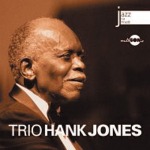 Prague castle, the Czech counterpart of the White House. The series was initiated by the Czech Republic's ranking jazz fan, its president, Vaclav Klaus. The first track of the CD is Klaus's brief welcome and introduction, in Czech. Jones takes over in the universal language of music, accompanied by the eminent Czech émigré bassist George Mraz and the young drummer Willie Jones III (no relation).
Prague castle, the Czech counterpart of the White House. The series was initiated by the Czech Republic's ranking jazz fan, its president, Vaclav Klaus. The first track of the CD is Klaus's brief welcome and introduction, in Czech. Jones takes over in the universal language of music, accompanied by the eminent Czech émigré bassist George Mraz and the young drummer Willie Jones III (no relation).
The trio establish their compatibility from the first notes. Through 13 pieces, it never wavers. The program typifies Jones' sense of contrast, balance and discovery. It begins with his brother Thad's "Lady Luck," written for third brother Elvin's 1962 album Elvin!. Willie Jones' brush wizardry and Mraz's restrained power blend under the elder Jones' buoyant, full-bodied improvisation. Behind Mraz's solo, Hank Jones gives a lesson, the first of many in the album, in the art of accompanying through reactive listening. Willie J. switches to sticks for a beautifully realized treatment of Joe Henderson's modern classic "Recorda Me."
The medium- and up-tempo tunes are a delight, but the ballads come close to stealing the CD. J.J. Johnson's "Lament" and Thelonious Monk's "'Round Midnight" demonstrate the three musicians' dedication to the principle of togetherness rather than emphasis on the individual. Which is not to suggest that Mraz and Willie Jones are less than splendid in solo. Willie is particularly effective in Hank's "Interface." The audience lets him know it. They show great warmth to hometown favorite Mraz, their most famous jazz export, particularly following his virtuoso solo on Wes Montgomery's "Twisted Blues." Commitment to the trio concept aside, Hank Jones firmly establishes his individualism in two-and-a-half unaccompanied minutes of "Lonely Woman," capturing the wistfulness of the piece. It is neither the Benny Carter nor the Ornette Coleman "Lonely Woman" but the relatively obscure song by William Stegmeyer and Richard Carney.
"Comin' Home, Baby," "Stella by Starlight" and "Speak Low" swing hard. Jones reaches deep into the harmonies of "Speak Low" and gives Mraz more of his attentive support as the bassist executes yet another of his perfect solos. Jones concludes with two by his contemporary, Monk. "Rhythm-A-Ning" and "Blue Monk" effectively cover two of the staples of modern jazz, "I Got Rhythm" changes and the blues. It's a terrific concert by one of the music's treasures and a fine way to remember Hank Jones.
Jakob Bro, Balladeering (Loveland). Bro is a young Danish guitarist with his own label and a sense of quiet daring in his music. He has the respect of musicians years older. That is what enabled him to enlist drummer Paul Motian, guitarist Bill Frisell, alto saxophonist Lee Konitz and bassist Ben Street as sideman for Balladeering. They recorded the CD with him in New York. Now in his early thirties, Bro attracted notice in Motian's Electic Bebop band, and further prominence with Polish trumpeter Tomas Stanko's group.
The title of the first tune in the CD, "Weightless," might stand as a description of Bro's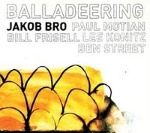 music, except that while the music floats and seems to make few demands on the listener, beneath its placid surface flow currents that compel thought and stimulate emotions in ways that, among the arts, only music can. Bro's and Frisell's guitars dart around and through one another, meld, shift, disperse and recombine. Konitz's tone takes on expansiveness in this setting. The lines he creates are mystic stories spun out by a wise elder. Street's deliberate bass patterns are more commentaries than guidelines. Motian's participation is the essence of what has made him unique for more than five decades. He splashes, shimmers, punctuates and urges, rarely stating the beat but always giving the music its pulse. The two versions of "Starting Point"—one acoustic, the other electric—constitute a stunning contrast in the difference the medium can make in the message of a piece of music.
music, except that while the music floats and seems to make few demands on the listener, beneath its placid surface flow currents that compel thought and stimulate emotions in ways that, among the arts, only music can. Bro's and Frisell's guitars dart around and through one another, meld, shift, disperse and recombine. Konitz's tone takes on expansiveness in this setting. The lines he creates are mystic stories spun out by a wise elder. Street's deliberate bass patterns are more commentaries than guidelines. Motian's participation is the essence of what has made him unique for more than five decades. He splashes, shimmers, punctuates and urges, rarely stating the beat but always giving the music its pulse. The two versions of "Starting Point"—one acoustic, the other electric—constitute a stunning contrast in the difference the medium can make in the message of a piece of music.
Bro's album runs under 45 minutes. He did not fill it to CD capacity, as far too many musicians do. I presume that is because he accomplished what he set out to achieve and was satisfied. Bravo.
AJ Ads
AJ Blogs
AJBlogCentral | rssculture
Terry Teachout on the arts in New York City
Andrew Taylor on the business of arts & culture
rock culture approximately
Laura Collins-Hughes on arts, culture and coverage
Richard Kessler on arts education
Douglas McLennan's blog
Dalouge Smith advocates for the Arts
Art from the American Outback
Chloe Veltman on how culture will save the world
For immediate release: the arts are marketable
No genre is the new genre
David Jays on theatre and dance
Paul Levy measures the Angles
Judith H. Dobrzynski on Culture
John Rockwell on the arts
innovations and impediments in not-for-profit arts
Jan Herman - arts, media & culture with 'tude
dance
Apollinaire Scherr talks about dance
Tobi Tobias on dance et al...
jazz
Howard Mandel's freelance Urban Improvisation
Focus on New Orleans. Jazz and Other Sounds
Doug Ramsey on Jazz and other matters...
media
Jeff Weinstein's Cultural Mixology
Martha Bayles on Film...
classical music
Fresh ideas on building arts communities
Greg Sandow performs a book-in-progress
Harvey Sachs on music, and various digressions
Bruce Brubaker on all things Piano
Kyle Gann on music after the fact
Greg Sandow on the future of Classical Music
Norman Lebrecht on Shifting Sound Worlds
Joe Horowitz on music
publishing
Jerome Weeks on Books
Scott McLemee on books, ideas & trash-culture ephemera
theatre
Wendy Rosenfield: covering drama, onstage and off
visual
Public Art, Public Space
Regina Hackett takes her Art To Go
John Perreault's art diary
Lee Rosenbaum's Cultural Commentary
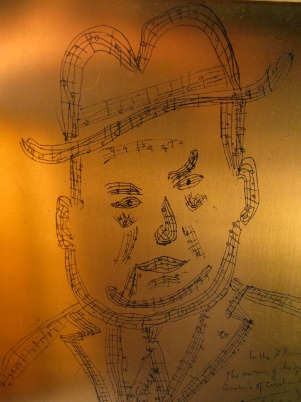
, Harewood-thumb-250x324-18023.jpg)

